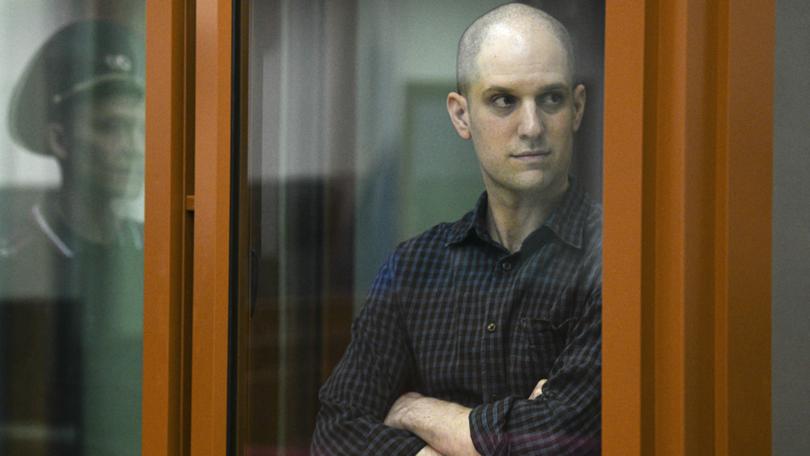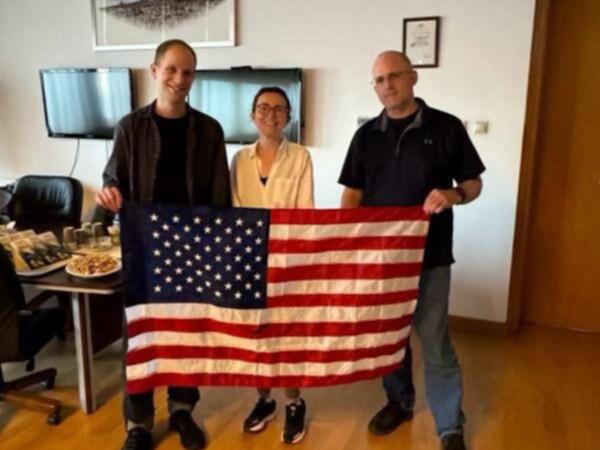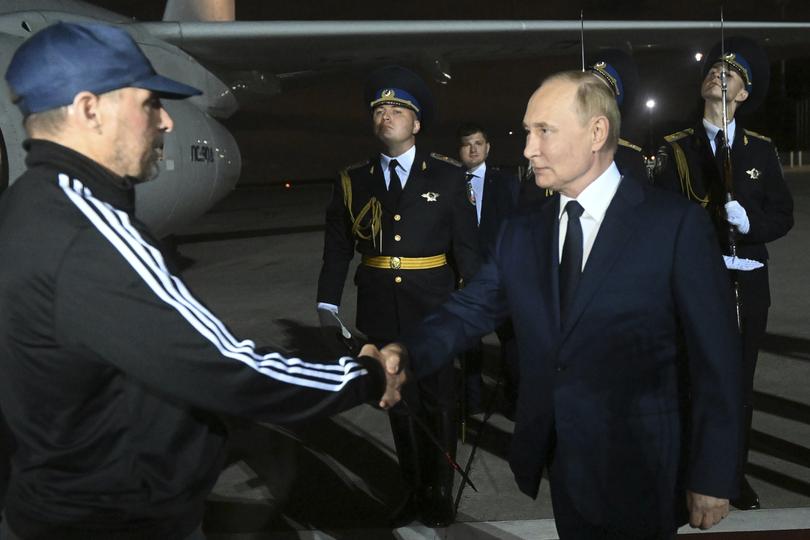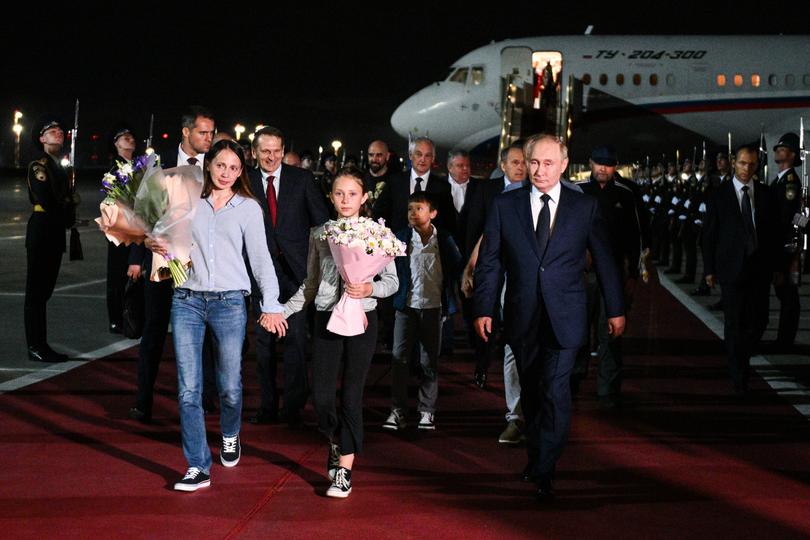THE ECONOMIST: The deal that freed Evan Gershkovich was more than a prisoner swap
Like a return to the Cold War, once again, the West has claimed the moral high ground by standing up for dissidents and treating human rights as an essential condition for peace in Europe.

It is the biggest prisoner exchange between Russia and the West since the Cold War.
It involved 26 prisoners held in seven different countries, including Russian dissidents; spies serving the Kremlin; American journalists; and a German mercenary.
It resembled a remake of a spy film set in the 1980s, when Vladimir Putin was serving as a KGB officer in Dresden.
Sign up to The Nightly's newsletters.
Get the first look at the digital newspaper, curated daily stories and breaking headlines delivered to your inbox.
By continuing you agree to our Terms and Privacy Policy.On the afternoon of August 1 seven aircraft from six countries landed in Ankara, bringing to fruition months of secret negotiations.
Among those whom the Russians released were Evan Gershkovich, a reporter for the Wall Street Journal imprisoned by Russia since March 2023 on trumped-up espionage charges. Another was Paul Whelan, an American ex-marine, who had been arrested in late 2018 while attending a friend’s wedding.

The youngest prisoner, 19-year-old Kevin Lick, is a Russian-German dual citizen who was jailed for taking pictures of a Russian military base. The oldest, 71-year-old Oleg Orlov, has been a dissident and activist since the Soviet era, and was co-chair of Memorial, a banned human-rights organisation.
Especially noteworthy were Vladimir Kara-Murza and Ilya Yashin, two opposition politicians. Both have been the most prominent voices of dissent in Russia since the death in custody of Alexei Navalny in February. Both had chosen prison over silence.
In return, Mr Putin got back the sort of people essential to his conduct of hybrid warfare against the West: assassins, smugglers, hackers and the deep-cover agents known as “illegals”.
The most valuable asset was Vadim Krasikov, a colonel in the FSB, Russia’s main security agency.

He had been jailed in Germany, where he had murdered a former Chechen rebel in broad daylight in central Berlin in 2019. Ensuring the release of such people helps Mr Putin command the loyalty of his security services.
Mr Putin initially hoped to negotiate directly with America about swapping Mr Gershkovich for Mr Krasikov, according to Christo Grozev of Bellingcat, an open-source intelligence outfit.

Mr Grozev, who earlier helped to identify the Russian agents responsible for poisoning Navalny and Mr Kara-Murza, was involved in negotiations over the prisoner exchange, which began more than two years ago. Germany, he says, insisted on including Navalny in the swap.
Navalny’s murder in a Siberian prison in February put negotiations on hold, Mr Grozev says. The Germans faced a dilemma: releasing the assassin would “reward Putin…despite Navalny’s death”, but it was needed to gain the freedom of “dozens of Russians and wrongly imprisoned Americans”.
In April Germany indicated that to get Mr Krasikov, Mr Putin would have to release several political prisoners.
Negotiations accelerated after Rico Krieger, a 30-year-old German, was taken hostage in unclear circumstances in Belarus (a Russian satellite state), and sentenced to death.
Earlier this week Aleksander Lukashenko, Belarus’s autocratic president, pardoned Mr Krieger, which suggested that a broader exchange might be coming.
Other clues of an imminent exchange included Mr Gershkovich’s sentencing on July 19th, earlier than expected, and the sudden disappearance of Russia’s high-profile political prisoners from their penal colonies a week later.
Interested parties tracked the flight paths of Russian jets between airports near the camps. Relatives, friends and lawyers held their breath.
It all felt like a return to the Cold War—not just in style but in substance. Once again, the West was claiming the moral high ground by standing up for dissidents and treating human rights as an essential condition for peace in Europe.
To be sure, there have been big prisoner exchanges more recently. In 2010 the Kremlin got back 11 of its sleeper agents in exchange for 11 citizens convicted of spying for Western countries.
Among those sent West was Sergei Skripal, a double agent whom Russia tried to kill with Novichok, a nerve poison, in Britain eight years later. But the current exchange is different. It also includes Russian politicians and prisoners of conscience who had chosen to go to jail, in protest against Mr Putin’s war on Ukraine.
Mr Kara-Murza is also a victim of suspected Novichok poisoning, in 2015 and again in 2017. He returned to Russia following its full-scale invasion of Ukraine in February 2022.
On his return he attacked Mr Putin’s regime as “not just corrupt” but “a regime of murderers”, and was soon arrested and sentenced to 25 years in jail for treason.
He spent much of his time in solitary confinement.
Mr Yashin, a charismatic politician and an ally of Navalny, spoke out about Russian atrocities in Ukraine.
He was sentenced to eight and a half years for discrediting the army, telling the court he would rather “spend ten years behind bars” than “burn in silent shame for the blood your government spills”.
Germany has long been seen as taking too transactional an approach to Russia. By insisting on the inclusion of political prisoners and activists in the swap, it reasserted the value of human rights as a core element of international security.
For Natan Sharansky, an Israeli politician and former Soviet prisoner of conscience, it recalled old struggles.
“It is as if I am reliving my release,” he told this newspaper.
Though exchanging political activists for assassins and spies might seem unfair, “every time one more person is released from the control of a totalitarian regime, the power of that regime is weakened.”
Russian human-right activists and lawyers were quick to point out that Mr Putin’s regime is still holding hundreds of prisoners of conscience.
They include Ivan Safronov, a journalist imprisoned for writing about corruption; Dmitry Ivanov, a maths student and anti-war blogger serving eight and a half years; Evgeniya Berkovich, sentenced to six years in jail for her poetry and theatre productions; and Alexei Gorinov, a Moscow council member sentenced to seven years for criticising the war.
The release of some prominent prisoners on August 1 should not obscure the plight of the many still in captivity.
